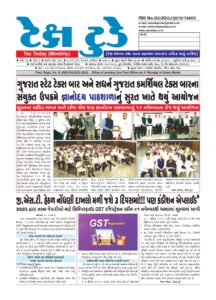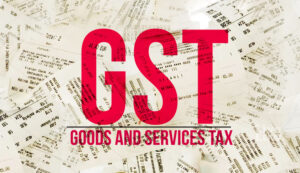GST WEEKLY UPDATE :21/2025-26 (24.08.2025) By CA Vipul Khandhar

-By CA Vipul Khandhar
- In a response to a Rajya Sabha unstarred question, the Ministry of Finance stated that, that Confirmed the nationwide implementation of Aadhaar-based biometric authentication for GST registration.
MINISTRY OF FINANCE DEPARTMENT OF REVENUE RAJYA SABHA UNSTARRED QUESTION NO. 2644 ANSWERED ON 12/08/2025:
(a) whether Government has any plan to implement the pilot project of Aadhar- based authentication for GST registration in Karnataka beyond the current testing phase;
(b) if so, the details thereof;
(c) whether the specific data analytics and risk parameters being used to detect fake ITC in Karnataka;
(d) if so, whether these mechanisms are likely to be tailored further to address regional challenges and patterns and if so, the details thereof; and
(e) the manner in which Government is ensuring adequate resources and training for GST officials in Karnataka to effectively combat sophisticated fraud schemes?
ANSWER:
Sponsored (a) & (b): Yes. Biometric-based Aadhaar authentication for GST registration, as mandated under Rule 8 of the CGST Rules, 2017, has been rolled out across States and Union Territories in a phased manner, depending on the readiness of the respective tax administrations. As of 01/05/2025, the implementation has been completed in all States and UTs in India.
(c) & (d): Various tools for GST analytics, such as automated risk assessment based on compliance attributes of taxpayers, highlighting of outliers based on system-flagged mismatches, etc., have been made available to GST administrations including Karnataka, to detect fake ITC. These tools are designed to combat GST fraud and various modus operandi, as highlighted from time to time, whether based on commodity, type of taxpayers, or any other relevant factor, and are not limited to regional patterns.
(e) Necessary instructions and guidelines are issued to field formations by CBIC from time to time.
- The detection of fake GST firms and Input Tax Credit (ITC) fraud.:
(e) the steps taken by Government to prevent fraudulent GST registrations and ITC claims; and
(f) the system in place to track repeated offenders or mastermind networks behind these fake firms?
ANSWER: (e): As steps taken by Government to prevent fraudulent GST registrations and ITC claims, amendments in GST laws, rules and procedures have been made to provide that: Input tax credit can only be availed in respect of such invoices or debit notes which have been furnished by the supplier in FORM GSTR-1 and details of which have been communicated to the registered person in FORM GSTR-2B. A registered person is not allowed to furnish FORM GSTR-1, if he has not furnished return in FORM GSTR-3B for the preceding tax period. Filing of FORM GSTR-1 is made mandatory before filing of FORM GSTR-3B for a tax period and filing of FORM GSTR-1 has been made mandatorily sequential. Electronic invoicing system (e-invoice) has been made mandatory for all B2B transactions for businesses with turnover exceeding Rs. 5 crore. OTP based verification of PAN on mobile number at time of registration and email address linked with PAN. This will help in preventing GST registration using PAN of other persons, without their knowledge. Risk based biometric-based Aadhaar authentication of registration applicants. An applicant who has not opted for Aadhaar authentication, will also be required to visit GST Suvidha Kendra for taking of photograph and for document verification. Physical verification in high-risk cases, even when Aadhaar has been authenticated. Details of bank account will be required to be furnished within 30 days of grant of registration or before filing of FORM GSTR-1/ IFF, whichever is earlier. System-based measures like: suspension of the registration in respect of such registered persons who do not furnish the details of valid bank account within the time period prescribed. suspension of registrations pertaining to registered persons who default in timely filing of returns is carried out in terms of provisions of rule 21A of the CGST Rules, 2017. the requirement of Geo-tagging of the place of business of the applicant for the new registrations has been provided on the portal. Automated notices under Rule 88C/88D in form of DRC-01B and DRC-01C are being issued. Offence of fraudulent availment of ITC without invoice or bill is now cognizable and non-bailable offence. Beneficiary, who retains benefit or at whose instance a supply has been made without the issuance of an invoice, or invoice has been issued without supply, or excess ITC has been availed/distributed, has been made liable for penalty. The Invoice Management System (IMS) is a functionality introduced on the GST portal in late 2024, designed to help recipient taxpayers manage incoming invoices more effectively. It allows recipients to accept, reject, or mark invoices as pending when these are saved or filed by their supplier taxpayers. With the implementation of IMS, registered recipients can now cross-verify and reconcile invoices reported by suppliers in their GSTR-1, thereby streamlining and strengthening the ITC claim process. To weed out fake/bogus registrations, a special drive against fake Input Tax Credit and fake registration was launched during the period from 16th May, 2023 to 15th July, 2023 and 16th August, 2024 to 15th October, 2024 in coordination between State and Central GST administrations.
(f): As a measure to track down and take action against repeated offenders or mastermind networks behind fake firms, there are sufficiently deterring legal provisions in the CGST Act which are as under:
- Punishment for tax evaded or the amount of ITC wrongly availed or utilised or the amount of refund wrongly taken;
- Suspension / Cancellation of registration of taxpayers involved in fake ITC cases;
iii. Blocking of ITC in electronic credit ledger;
- Provisional attachment of property / bank accounts, etc. for the recovery of Government dues; Further, risk profiling and risk categorization is being undertaken in a near real time manner on the basis of 360-degree profiling of the taxpayers. Intelligence generation tool based on data analysis have been deployed and is shared with tax administrations. Moreover, Non- Genuine Tax Payer module has been implemented by GSTN to flag bogus/high risk taxpayers.
- whether the government was aware that Khadi & Village Industries Commission (KVIC) products are handmade, leading to high production costs. He also asked if these products are taxed up to 12% GST and if the government would consider exempting them from GST to support employment.
Answer: That Khadi products are indeed handmade and labor-intensive, which contributes to their high manufacturing cost. The minister explained that while some items like Khadi yarn and fabric sold at KVIC outlets, Gandhi Topis, and the Indian National Flag have a “Nil” GST rate, many handmade textile products are taxed at a concessional 5% GST. Hand-stitched apparel and clothing accessories valued under Rs. 1000 attract a 5% GST, while those above this price point are taxed at 12% and
(c) if so, whether the Government is considering to exempt all Khadi products from GST to 54 provide/sustain employment in this traditional sector of the country?
ANSWER:
(a) The production process of Khadi products is hand spun and hand woven in nature and it is a labour/artisan intensive activity. Due to this fully manual nature of operations in manufacturing Khadi and Village Industry products, the manufacturing cost constitutes a significant portion of the overall product cost.
(b) GST rates are prescribed on the recommendations of GST Council, which is a constitutional body comprising of representatives from States/UTs and Centre. Khadi yarn and Khadi fabric sold from KVIC outlets, Gandhi Topi and Indian National flag attract Nil GST. Most handmade textile products attract concessional GST rate of 5%. Handmade articles of apparel and clothing accessories, knitted or crocheted, of sale value upto Rs. 1000 per piece attracts 5% GST and 12% otherwise.
(c) The GST Council in its 45th meeting held on 17th September, 2021, has constituted a Group of Ministers (GoM) on GST Rate Rationalisation. The terms of reference of the GoM include review of the current rate slab structure of GST and recommend rationalization of rates.
4.: GST rate on flex fuel vehicles
(a) whether the Government is promoting alternative fuel to be used in vehicles;
(b) whether it is true that States are levying higher GST on flex-fuel vehicle, thereby defeating the very objective of pushing growth in automobile industry; (c) whether any appeal/request has been made by the Government to States to reduce GST on flex-fuels from the present 28% to 12%;
(d) if so, the details thereof;
(e) whether the Government is considering to reduce the above duties to 5% as is being done in case of Electric Vehicles and 12% in the case of hydrogen fuel cell vehicles;
(f) whether any discussion on the above issue has been held in the GST Council; and
(g) if so, the details thereof
ANSWER:
(a) The government is taking many measures for promotion of alternative fuels to be used in vehicles:
(i) Ministry of Petroleum and Natural Gas has revised the guideline for granting authorization to market Motor Spirit and High-Speed Diesel. The authorized entities and the public sector Oil Marketing companies are now required to install facilities for marketing at least one new generation alternate fuels like Compressed Natural Gas (CNG), biofuels, Liquefied Natural Gas (LNG), electric vehicle charging stations (EVCSs), etc. at their proposed retail outlets within three years of operationalization of the said outlet subject to the entity complying with various other statutory guidelines.
(ii) Ministry of Road Transport & Highways (MoRTH) has notified emission norms to facilitate the use of various alternative fuel vehicles, ensuring their compliance to standards. These norms cover Ethanol-blended fuels, hydrogen, CBG, LNG and Electric Vehicles (EV).
(iii) Based on the recommendation of the GST Council, a concessional GST rate of 5% has been prescribed on ethanol and biodiesel supplied to Oil Marketing Companies or Petroleum refineries for blending with motor spirit and highspeed diesel oil.
(iv) Blending of duty paid petrol with duty paid ethanol and duty paid biodiesel with high- speed diesel has been exempted from excise duty.
(v) Unblended petrol attracts an additional excise duty of Rs 2 per (b) The GST rates are based on the recommendation of the GST Council, which is a constitutional body comprising of member from the Centre and State governments. Presently the GST rate applicable on internal combustion vehicles is 28% irrespective of the type of fuel used including alternative fuels. (c) & (d) The GST rates are based on the recommendation of the GST Council, which is a constitutional body comprising of member from the Union and State governments/UTs. The issue of reduction of the GST rate on flex fuel vehicles was deliberated by the GST Council in its 52nd Meeting held on 07.10.2023. However, the Council has not recommended any change in this regard. However, the Ministry of Road Transport & Highways (MoRTH) has requested all States Governments and Union Territories to consider exemption or reduction of road tax on Flex Fuel Vehicles (FFVs) as a fiscal incentive to users. (e) to (g) The GST rates are based on the recommendation of the GST Council, which is a constitutional body comprising of member from the Union and State governments/UTs.
- AAR & Important Judgements:
(i) The Hon’ble Supreme Court in Civil Appeal No. 9543 of 2025 held as under:
- Observed that, Section 83(2) of the Act provides that provisional attachments cease by operation of law after one year; no statutory provision allows extension, renewal, or re-issuance.
- Noted that, the nature of Section 83(1) requires strict compliance with statutory limits; permitting re-issuance would render Section 83(2) ineffective.
- Observed that, executive powers or instructions cannot override statutory text; absence of any instruction authorising renewal does not justify a second attachment.
- Noted that, issuing a fresh attachment on substantially identical grounds as a lapsed order would indirectly circumvent Section 83(2) and constitute abuse of power.
- Observed that, failure to dispose of the Petitioner’s representation under Rule 159(5) before re-issuance further violates statutory procedure and due process.
- Noted that, comparison with other statutes (Excise Act Section 11DDA, Customs Act Section 28BA) shows deliberate legislative choice under the CGST Act, 2017 not to allow renewal.
- Observed that, pending alignment of Rule 159 with Section 83(2), authorities must enforce the one-year lapse strictly and that procedural misalignment does not justify continued encumbrance.
Held that, the Respondent cannot lawfully issue a second or renewed provisional attachment once the first order has lapsed and issuance on same grounds or without disposing representations is ultra vires and liable to be set aside.
(ii) Rajasthan HC to examine if Additional-Director, DGGI is a ‘proper-officer’; Issues notice, stays SCN:
(Applicant – Acme Cleantech Solution Pvt. Ltd.)
The petitioner disputes Notification No. 14/2017 and Circular No. 3/3/2017, arguing that vesting the Additional Director, DGGI with powers under Section 74 of the CGST Act is ultra vires Section 2(91) read with Sections 3 and 5.
It is argued that Section 2(91) vests the power to assign functions only in “the Commissioner” (a statutory authority), not “the Board” itself, making the delegation through Board notifications invalid.
The HC stayed the operation of the show cause notice (SCN) issued by DGGI, granting interim protection to the petitioner.
The petitioner relied on the coordinate bench order in Mohit Kirana Store, where a similar challenge to summons issued by DGGI officers was stayed; the HC has tagged the present matter with that case for consolidated consideration.
Apart from officer appointment, the petitioner contests Para 11 of Circular No. 80/54/2018-GST, claiming it wrongly restricts the concessional 5% GST rate to Chapters 84, 85, and 94, contrary to the broader scope of Entry 234 and Entry 201A of Notification No. 1/2017-CT (Rate).
(iii) Hon’ble Highcourt Decision Regarding landowner enter in JDA not liable for GST if GST on entire property collected from developer:
(Applicant – Shyamaraju and Co (India) (P.) Ltd.)
The landowner entered into a JDA with a developer to construct residential apartments. The developer discharged GST liability on the entire project, including the landowner’s 30% share.
Authorities held the landowner separately liable for GST on 100% of the property, arguing that the JDA was an unregistered document and hence could not be relied upon to shift liability to the developer.
The Court held that since GST on the full project had already been paid by the developer, demanding GST again from the landowner would result in impermissible double taxation.
The Deputy Commissioner (Audit) had earlier recognized and acted upon the JDA, accepting GST liability and payment by the developer. Therefore, the Revenue could not later take a contradictory stance against the landowner.
The impugned demand against the landowner was quashed, with the Court affirming that once GST had been discharged by the developer, no separate liability could be imposed on the landowner under the same transaction.
Disclaimer:
This publication contains information for general guidance only. It is not intended to address the circumstances of any particular individual or entity. Although the best of endeavour has been made to provide the provisions in a simpler and accurate form, there is no substitute to detailed research with regard to the specific situation of a particular individual or entity. We do not accept any responsibility for loss incurred by any person for acting or refraining to act as a result of any matter in this publication.





